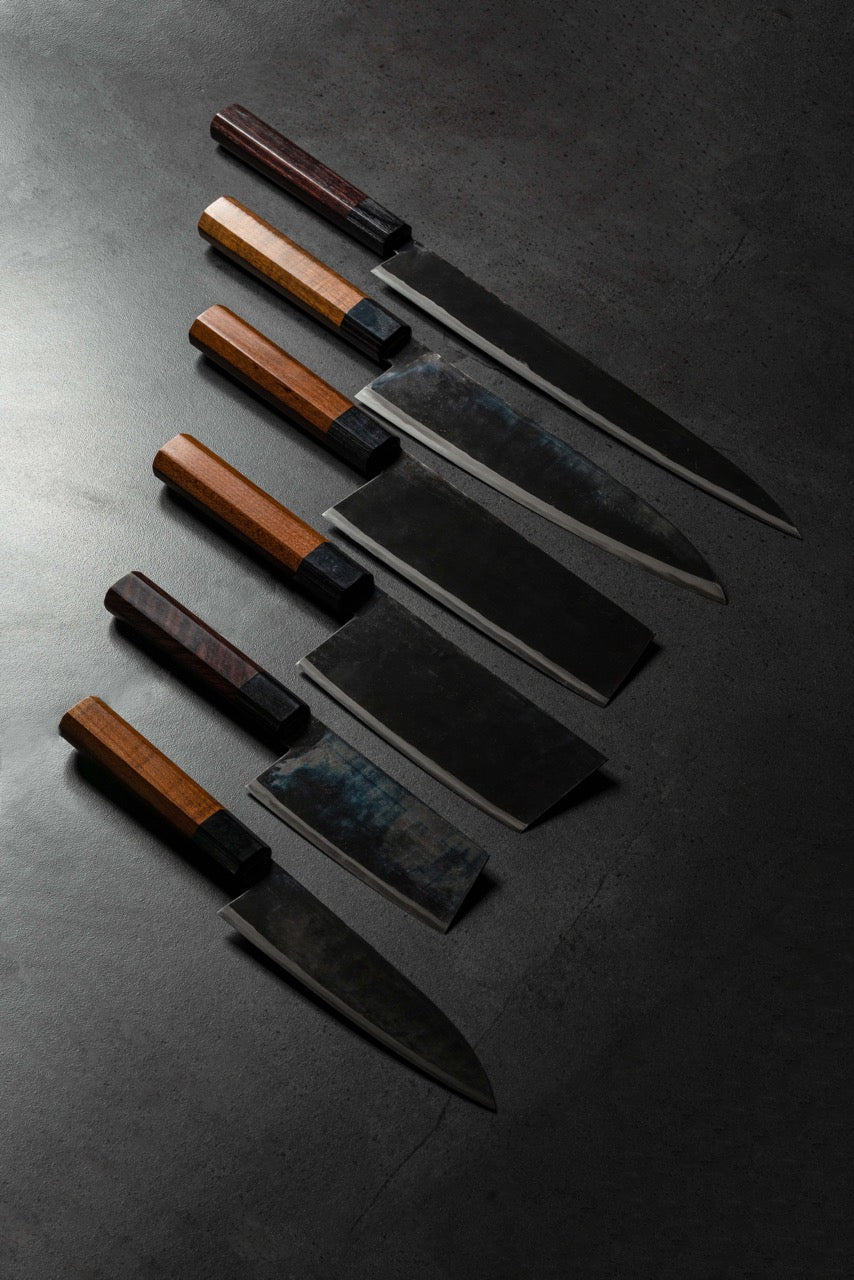
Yoshida Hamono HAP 40 Gyuto 210mm Kurouchi Maple Burl (Red)
Description
When HAP 40 first became available, Osamu Yoshida quickly bought the steel and tried it out. He was amazed at how incredibly sharp the steel could become and how long it would hold its edge, so he began making kitchen knives using this super steel. Although it is a difficult steel to handle, he feels a great sense of accomplishment when he forges with it compared to other steels.
In addition to laminating their own steel, they also treat their knives with sub-zero heat to purify the steel, which allows the knife to work better and sharpen better. This is done after quenching, treating the knives with liquid nitrogen to remove excess retained impurities that have not been converted to martensite. This prevents the knife from bending over time by "stabilizing" its structure. While this is scientific mumbo jumbo for most, it is a big deal in the knife making world.
The secret of this knife lies in its hard core made of a somewhat exotic Hitachi HAP-40 steel, which falls into the category of modern, technologically advanced steels. HAP-40 is thin enough to sharpen very well, and knives made from it retain their edge 3-5 times longer than traditional knives. An interesting fact is that because it is a powdered steel, it has a very low chromium content (about 4%) and can react like a high carbon steel under specific circumstances.
This steel is heat treated to an incredible 68 HRC, but it can still be sharpened relatively easily on whetstones. It is extremely durable and therefore less likely to chip along the edge than the steel used in traditional knives.
Tips for best results
Make sure your knife will deliver its absolute best by having it professionally sharpened at least once a year. Please note that our meticulously handcrafted Japanese knives are – unless otherwise noted – carbon steel and not stainless steel. To prevent rust, make sure the blades are patted dry – especially when cutting acidic items. Never cut frozen foods, hard products, bone, or twist the blade when using. Never soak in water after use or put in the dishwasher. After use, store in a cool, dry place and avoid high temperature fluctuations.
Our commitment to you – our customers
Warranty
Every knife we carry has a lifetime warranty from manufacturing defects and errors. For example, if the handle becomes detached or cracks appear after a few weeks of proper use. Or if there are any blade cracks from the edge to the spine. While such defects are indeed rare, they can occur. In such cases, we will exchange the knife in question or give you a refund. Each warranty case is different depending on the criteria, and we reserve the right in each and every case to evaluate the applicability of our lifetime warranty in the event of any manufacturing defects and errors.
After-Sales service
Do you get the feeling that your knife just can’t “cut it”?
Each knife we carry is supplied with a so-called “factory edge”. Our chef knife range comprises more than 200 different products. While all our handcrafted Japanese knives ship with a “factory edge”, ultimate blade sharpness can vary. If you feel that your knife’s blade edge is not performing to its full potential, feel free to contact us and we will provide you with professional sharpening for free!
Oops! What about the truly Unthinkable?
Was it just through a slight slip of the hand that your knife accidentally fell on the floor and damaged its tip and blade, or it was used to cut a hard, frozen product and chipped? Don’t despair, get in touch with us and we will solve the problem through our in-house, professional sharpening and repair service.
Simply contact us or visit our store to get a free estimate.











